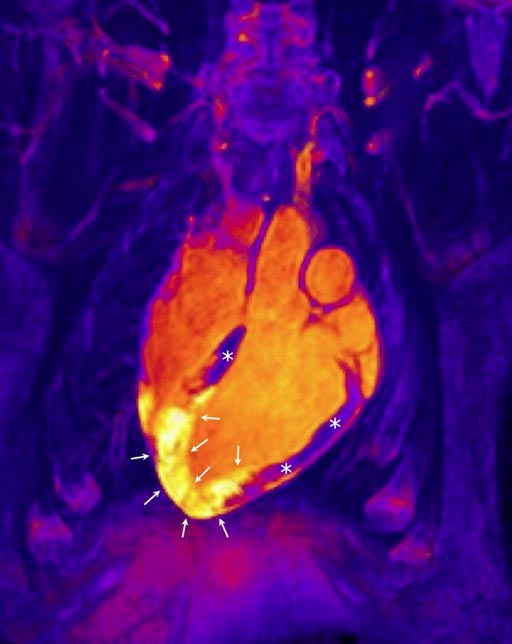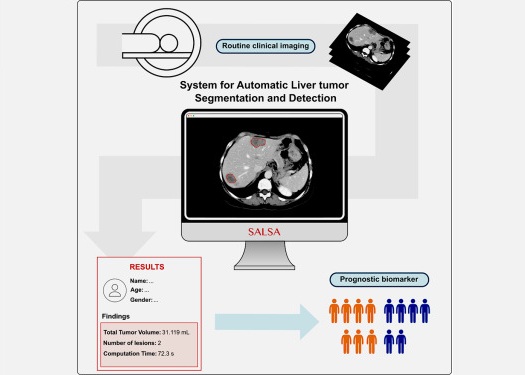Studies Reveal Insights in Heart Response to MI
|
By MedImaging International staff writers Posted on 05 Sep 2017 |

Image: The 3D image shows the results of an MRI scan following an acute MI (Photo courtesy of the CNIC).
Researchers have demonstrated that the human heart responds differently to an infarction than previously assumed.
The researchers used Magnetic Resonance Imaging (MRI) millimeter-resolution scans for their research, and mapped the tissue composition of the myocardium to investigate how it reacts to an infarction.
One article was published online in the August 22, 2017, issue of the journal Circulation and in the journal Circulation Research by scientists from the Centro Nacional de Investigaciones Cardiovasculares Carlos III (CNIC; Madrid, Spain), Hospital Universitario Fundación Jiménez Díaz (FJD; Madrid, Spain), and the University Hospital of Salamanca (IBSAL; Salamanca, Spain).
The results of the two independent studies reverse the current view that progressive repair of the myocardium takes place after an infarction, and could lead to new and better therapies. Scientists previously believed that an inflammatory response with increased water content, and cellular infiltration, were the immediate consequences of a heart attack, continuing for one week or more after the event.
Cardiologist Dr. Borja Ibáñez, said, "the discovery of the bimodal inflammatory response in the human heart forces us to think about the best timing for MRI scans used in clinical trials to quantify irreversible injury and to monitor the effectiveness of interventions to reduce this injury. Until now this question was not considered important, and cardiac imaging studies have been conducted on any day in the postinfarction period. The new findings show that the optimal time for these scans is between postinfarction days 4 and 7, when the second inflammatory/edematous wave is prominent and affects the entire region that was shut off from the blood supply during the infarction."
Related Links:
Centro Nacional de Investigaciones Cardiovasculares Carlos III
Hospital Universitario Fundación Jiménez Díaz
University Hospital of Salamanca
The researchers used Magnetic Resonance Imaging (MRI) millimeter-resolution scans for their research, and mapped the tissue composition of the myocardium to investigate how it reacts to an infarction.
One article was published online in the August 22, 2017, issue of the journal Circulation and in the journal Circulation Research by scientists from the Centro Nacional de Investigaciones Cardiovasculares Carlos III (CNIC; Madrid, Spain), Hospital Universitario Fundación Jiménez Díaz (FJD; Madrid, Spain), and the University Hospital of Salamanca (IBSAL; Salamanca, Spain).
The results of the two independent studies reverse the current view that progressive repair of the myocardium takes place after an infarction, and could lead to new and better therapies. Scientists previously believed that an inflammatory response with increased water content, and cellular infiltration, were the immediate consequences of a heart attack, continuing for one week or more after the event.
Cardiologist Dr. Borja Ibáñez, said, "the discovery of the bimodal inflammatory response in the human heart forces us to think about the best timing for MRI scans used in clinical trials to quantify irreversible injury and to monitor the effectiveness of interventions to reduce this injury. Until now this question was not considered important, and cardiac imaging studies have been conducted on any day in the postinfarction period. The new findings show that the optimal time for these scans is between postinfarction days 4 and 7, when the second inflammatory/edematous wave is prominent and affects the entire region that was shut off from the blood supply during the infarction."
Related Links:
Centro Nacional de Investigaciones Cardiovasculares Carlos III
Hospital Universitario Fundación Jiménez Díaz
University Hospital of Salamanca
Latest MRI News
- Cutting-Edge MRI Technology to Revolutionize Diagnosis of Common Heart Problem
- New MRI Technique Reveals True Heart Age to Prevent Attacks and Strokes
- AI Tool Predicts Relapse of Pediatric Brain Cancer from Brain MRI Scans
- AI Tool Tracks Effectiveness of Multiple Sclerosis Treatments Using Brain MRI Scans
- Ultra-Powerful MRI Scans Enable Life-Changing Surgery in Treatment-Resistant Epileptic Patients
- AI-Powered MRI Technology Improves Parkinson’s Diagnoses
- Biparametric MRI Combined with AI Enhances Detection of Clinically Significant Prostate Cancer
- First-Of-Its-Kind AI-Driven Brain Imaging Platform to Better Guide Stroke Treatment Options
- New Model Improves Comparison of MRIs Taken at Different Institutions
- Groundbreaking New Scanner Sees 'Previously Undetectable' Cancer Spread
- First-Of-Its-Kind Tool Analyzes MRI Scans to Measure Brain Aging
- AI-Enhanced MRI Images Make Cancerous Breast Tissue Glow
- AI Model Automatically Segments MRI Images
- New Research Supports Routine Brain MRI Screening in Asymptomatic Late-Stage Breast Cancer Patients
- Revolutionary Portable Device Performs Rapid MRI-Based Stroke Imaging at Patient's Bedside
- AI Predicts After-Effects of Brain Tumor Surgery from MRI Scans
Channels
Radiography
view channel
AI Improves Early Detection of Interval Breast Cancers
Interval breast cancers, which occur between routine screenings, are easier to treat when detected earlier. Early detection can reduce the need for aggressive treatments and improve the chances of better outcomes.... Read more
World's Largest Class Single Crystal Diamond Radiation Detector Opens New Possibilities for Diagnostic Imaging
Diamonds possess ideal physical properties for radiation detection, such as exceptional thermal and chemical stability along with a quick response time. Made of carbon with an atomic number of six, diamonds... Read moreUltrasound
view channel.jpeg)
AI-Powered Lung Ultrasound Outperforms Human Experts in Tuberculosis Diagnosis
Despite global declines in tuberculosis (TB) rates in previous years, the incidence of TB rose by 4.6% from 2020 to 2023. Early screening and rapid diagnosis are essential elements of the World Health... Read more
AI Identifies Heart Valve Disease from Common Imaging Test
Tricuspid regurgitation is a condition where the heart's tricuspid valve does not close completely during contraction, leading to backward blood flow, which can result in heart failure. A new artificial... Read moreNuclear Medicine
view channel
Novel Radiolabeled Antibody Improves Diagnosis and Treatment of Solid Tumors
Interleukin-13 receptor α-2 (IL13Rα2) is a cell surface receptor commonly found in solid tumors such as glioblastoma, melanoma, and breast cancer. It is minimally expressed in normal tissues, making it... Read more
Novel PET Imaging Approach Offers Never-Before-Seen View of Neuroinflammation
COX-2, an enzyme that plays a key role in brain inflammation, can be significantly upregulated by inflammatory stimuli and neuroexcitation. Researchers suggest that COX-2 density in the brain could serve... Read moreGeneral/Advanced Imaging
view channel
AI-Based CT Scan Analysis Predicts Early-Stage Kidney Damage Due to Cancer Treatments
Radioligand therapy, a form of targeted nuclear medicine, has recently gained attention for its potential in treating specific types of tumors. However, one of the potential side effects of this therapy... Read more
CT-Based Deep Learning-Driven Tool to Enhance Liver Cancer Diagnosis
Medical imaging, such as computed tomography (CT) scans, plays a crucial role in oncology, offering essential data for cancer detection, treatment planning, and monitoring of response to therapies.... Read moreImaging IT
view channel
New Google Cloud Medical Imaging Suite Makes Imaging Healthcare Data More Accessible
Medical imaging is a critical tool used to diagnose patients, and there are billions of medical images scanned globally each year. Imaging data accounts for about 90% of all healthcare data1 and, until... Read more
Global AI in Medical Diagnostics Market to Be Driven by Demand for Image Recognition in Radiology
The global artificial intelligence (AI) in medical diagnostics market is expanding with early disease detection being one of its key applications and image recognition becoming a compelling consumer proposition... Read moreIndustry News
view channel
GE HealthCare and NVIDIA Collaboration to Reimagine Diagnostic Imaging
GE HealthCare (Chicago, IL, USA) has entered into a collaboration with NVIDIA (Santa Clara, CA, USA), expanding the existing relationship between the two companies to focus on pioneering innovation in... Read more
Patient-Specific 3D-Printed Phantoms Transform CT Imaging
New research has highlighted how anatomically precise, patient-specific 3D-printed phantoms are proving to be scalable, cost-effective, and efficient tools in the development of new CT scan algorithms... Read more
Siemens and Sectra Collaborate on Enhancing Radiology Workflows
Siemens Healthineers (Forchheim, Germany) and Sectra (Linköping, Sweden) have entered into a collaboration aimed at enhancing radiologists' diagnostic capabilities and, in turn, improving patient care... Read more










 Guided Devices.jpg)










